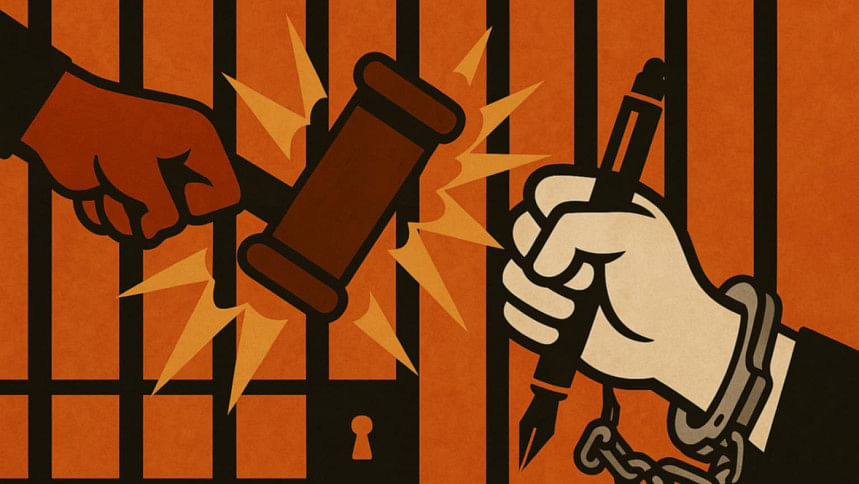Is Mahmudul's arrest a message?

You came to power claiming to break a cycle of abuse. You promised a clean slate. No more false cases. No more teachers jailed for speaking the truth. No more students beaten for dissent.
You promised justice. And then we get this.
A journalism teacher at Begum Rokeya University, Mahmudul Haque now sits in jail.
His crime? He had demanded accountability when a student was gunned down on campus.
His punishment? Being named, without evidence, in a murder case filed ten months after a man died, not from violence, but from a stroke.
The man, Shamesh Uddin, reportedly collapsed in fear during a police raid in the July uprising.
His death, medically confirmed as a stroke, was thus a tragic consequence of the very state intimidation Mahmudul spoke out against.
Postmortem indicated no assault. None of the witnesses named Mahmudul. Nor did the family.
Yet his name, out of nowhere appears in the first information report bloated with political targets.
Why?
They say he was a leader of the Bangabandhu Parishad.
So what if he was?
Is political affiliation now a jailable offence? Or is it just a convenient label used to criminalise anyone remotely connected to the last regime, thereby turning legitimate political association into a pretext for persecution?
This arrest is a deliberate message. It sends a troubling signal: those who speak out may find themselves punished. This message weighs heavily on academics, journalists, and citizens who believe in the right to dissent.
Mahmudul is a victim, as well as a warning.
Mahmudul wasn't hiding. He didn't flee. He didn't attack anyone. His only weapon was his pen. His only threat was the truth.
When the police killed Abu Sayed on campus during the July protests, Mahmudul did what few dared.
He spoke out. He called out the lies. He demanded a judicial probe.
He wrote in grief and fury, like any teacher with a conscience should: "If only I could stop the bullet with my own hands."
Then, how come such a courageous teacher ended up in jail?
There is no murder weapon. No forensic report. No witnesses. Not even a credible timeline.
Yet the state wants us to believe that a teacher, who wasn't even there, somehow orchestrated a death already ruled as a stroke.
It is a script designed not to seek truth, but to silence one man, and frighten the rest.
The interim government had vowed to restore fairness and uphold due process—especially in politically charged cases. But with Mahmudul's arrest, without a credible investigation or due process, that promise rings hollow.
Let us ask clearly then: Where is the proof of Mahmudul's involvement? What is the motive? What motive could there be for a death clinically determined to be a stroke?
A crime is hardly being investigated here, but one is certainly being invented.
Why wait 10 months to file a case, otherwise? Why name someone the victim's family never accused?
Because it was about warning others. About punishing someone not for what he did; but for what he dared to say. Or worse; it was about punishing him for who he's allegedly connected to.
The government has a duty to uphold the law—not to bend it for expedience. It promised reform, not revenge. The arrest of a teacher under such dubious circumstances undermines public confidence and deepens mistrust.
This isn't just about Mahmudul. It's about every citizen who still believes truth has a place in public life. If the interim government is committed to justice, let this be a test.
Until this case is reviewed with full transparency, and until Mahmudul Haque receives the justice he deserves, calls for reform will remain unconvincing, and promises of fairness will feel distant.
[Arafat Rahaman is a journalist at The Daily Star. Have thoughts on this piece? Reach him at [email protected]]

 For all latest news, follow The Daily Star's Google News channel.
For all latest news, follow The Daily Star's Google News channel. 



Comments